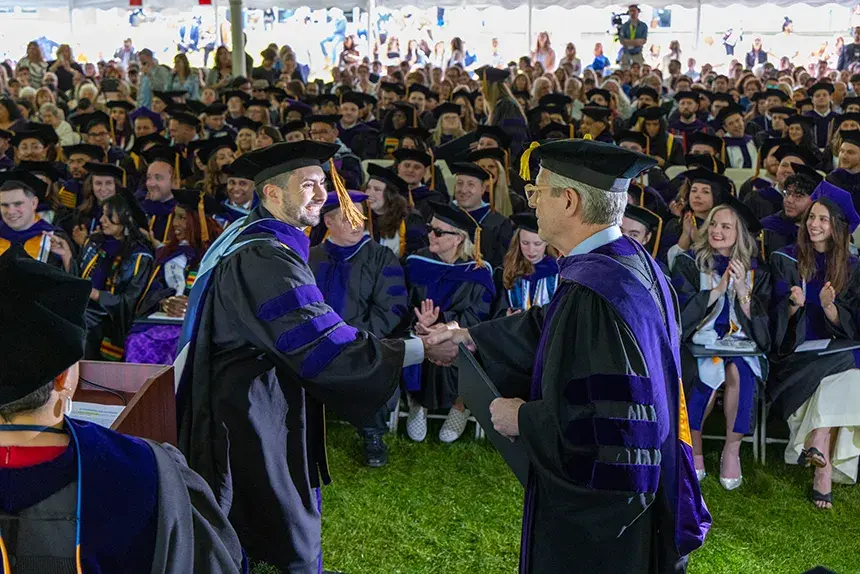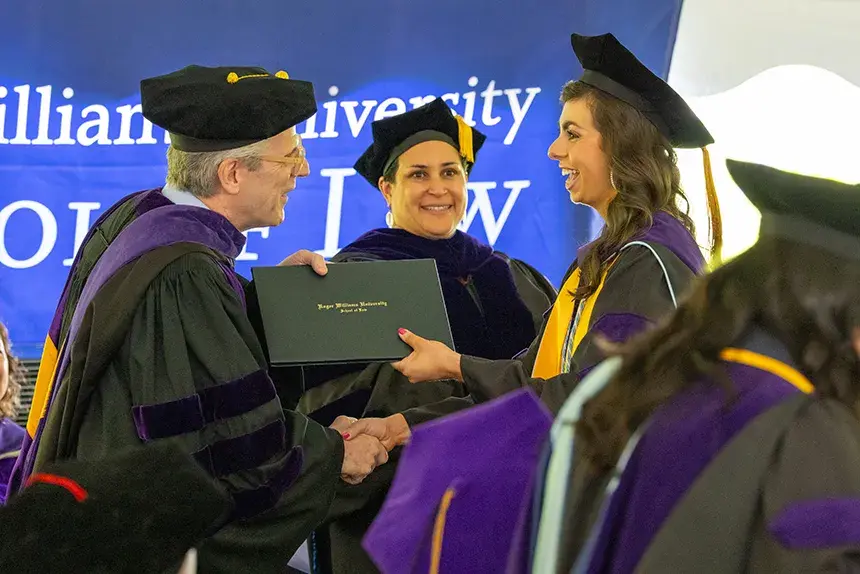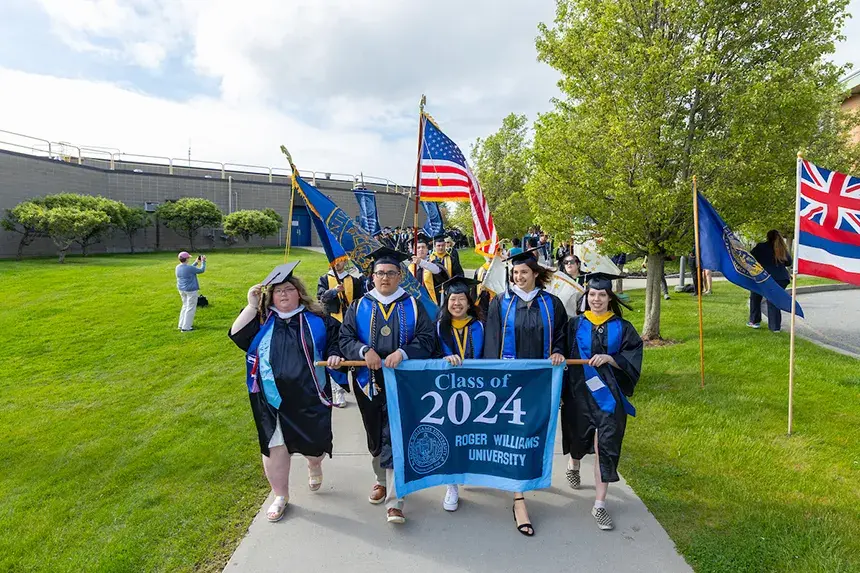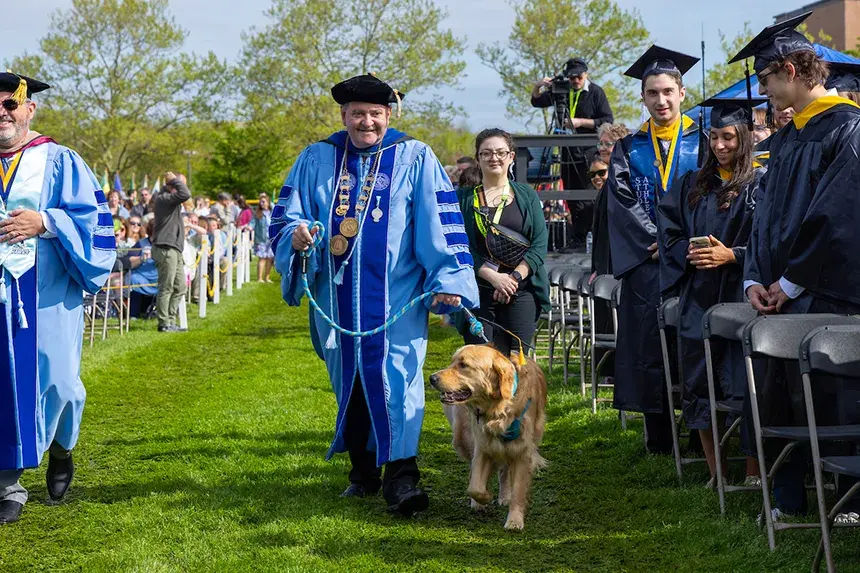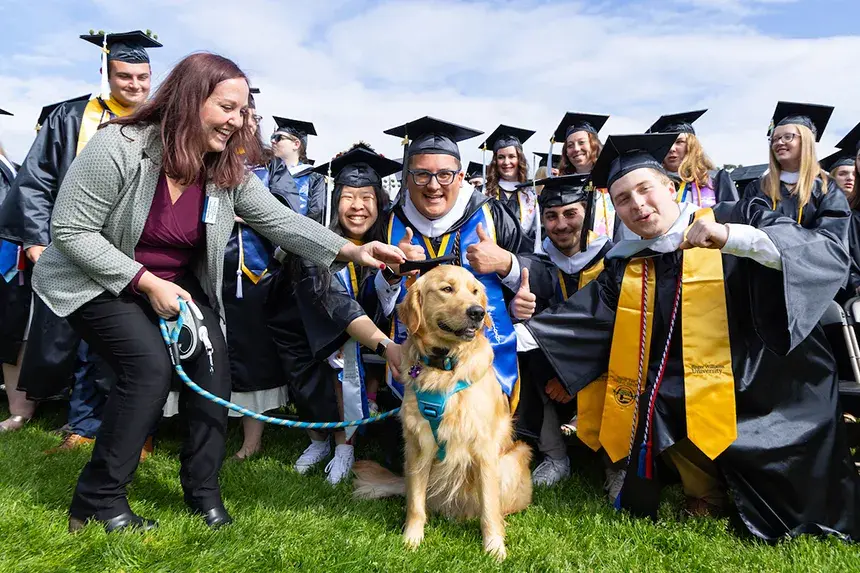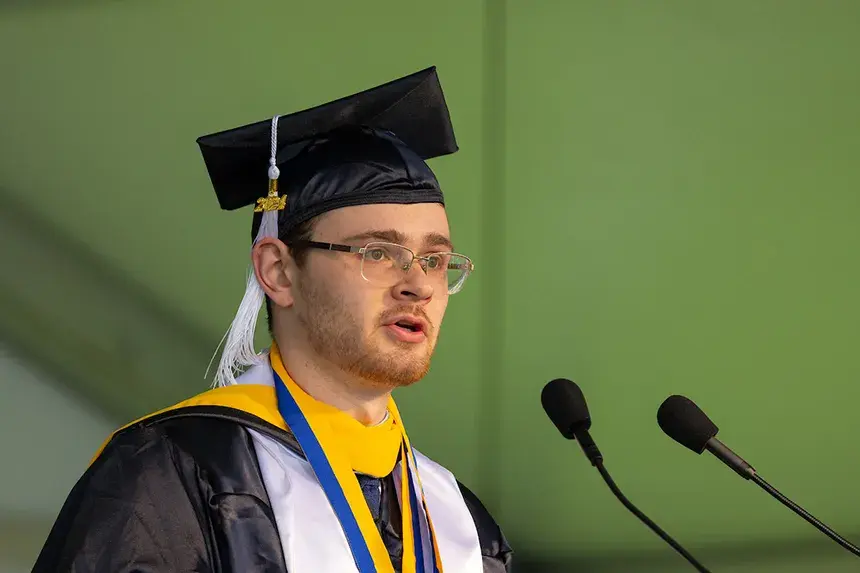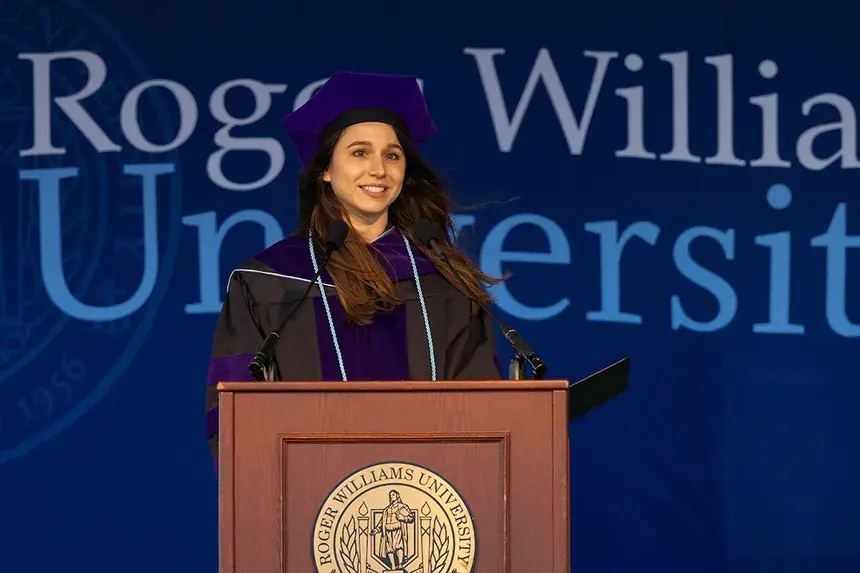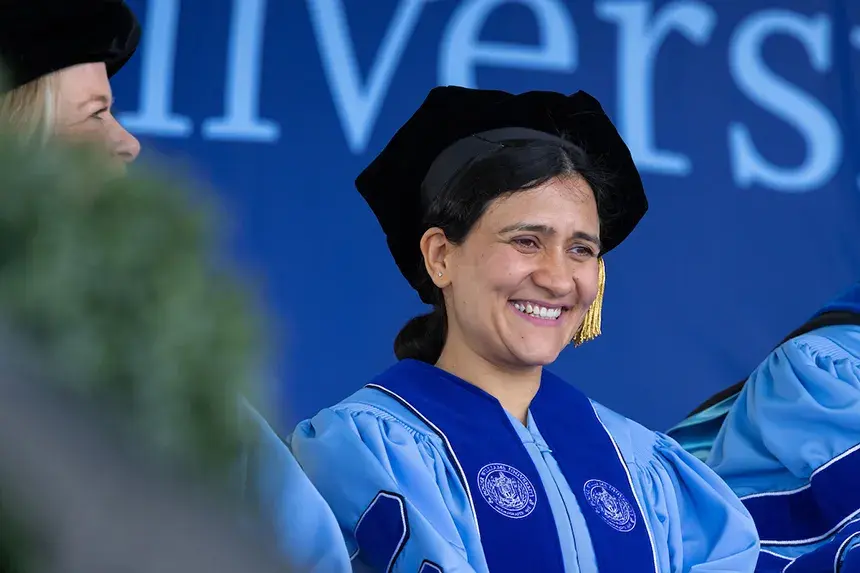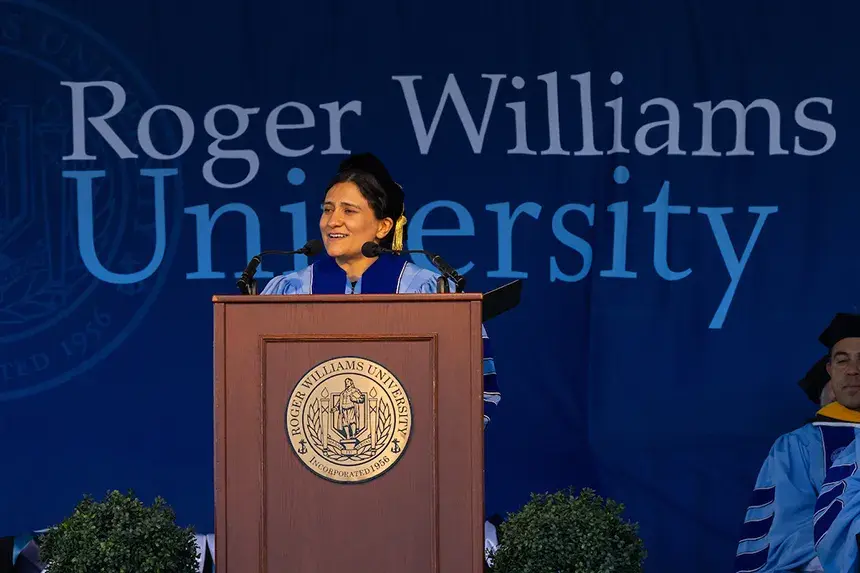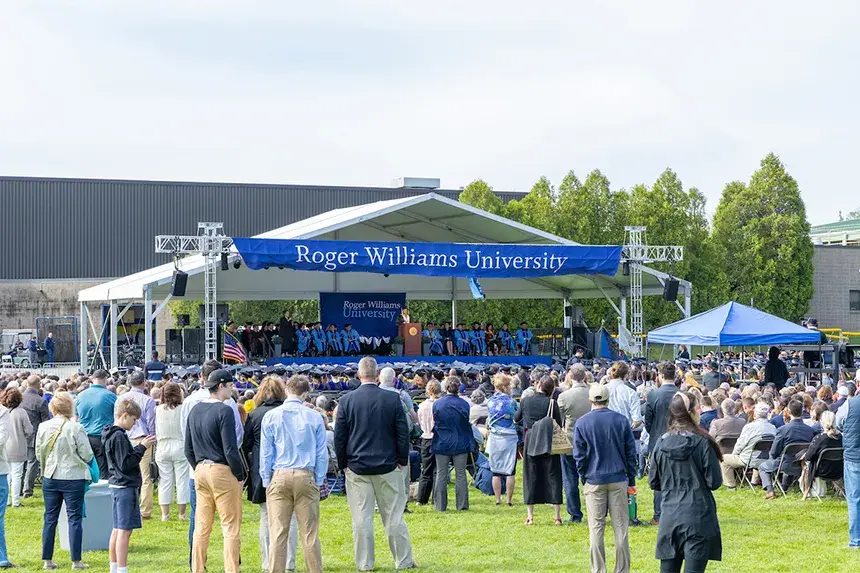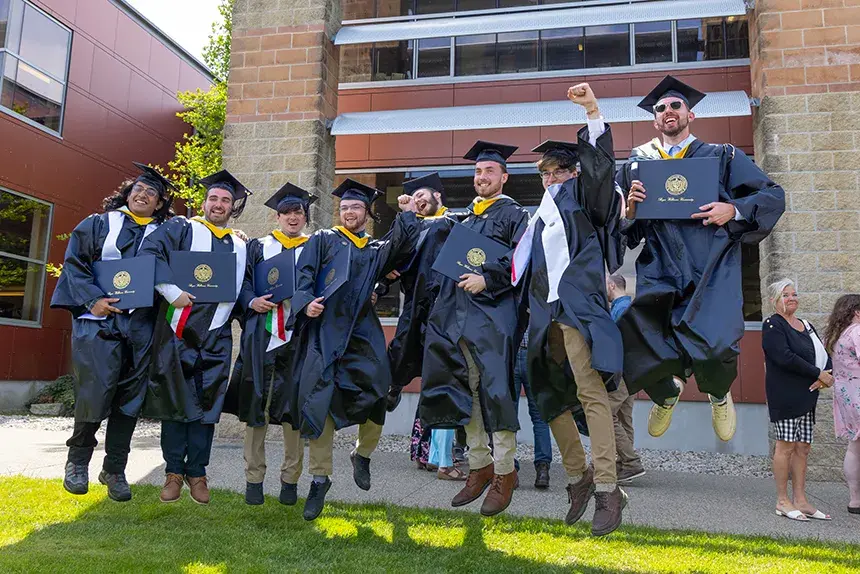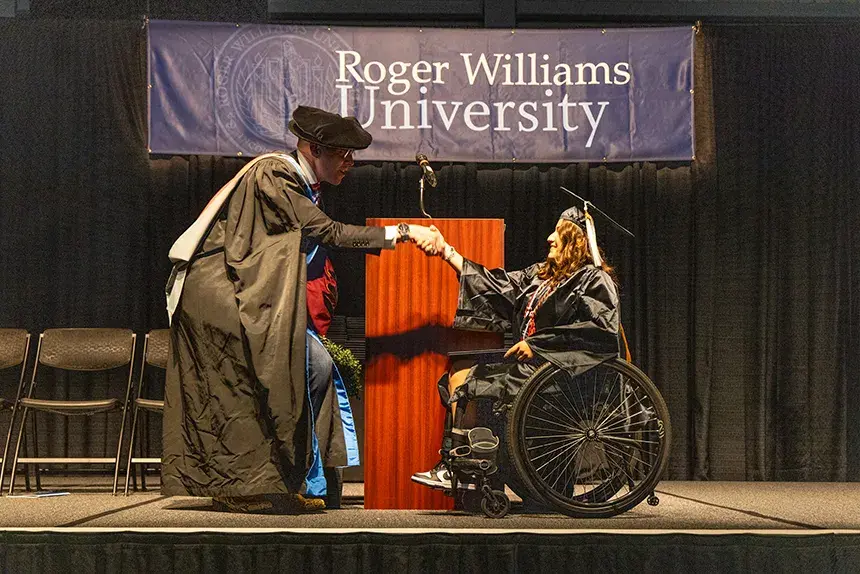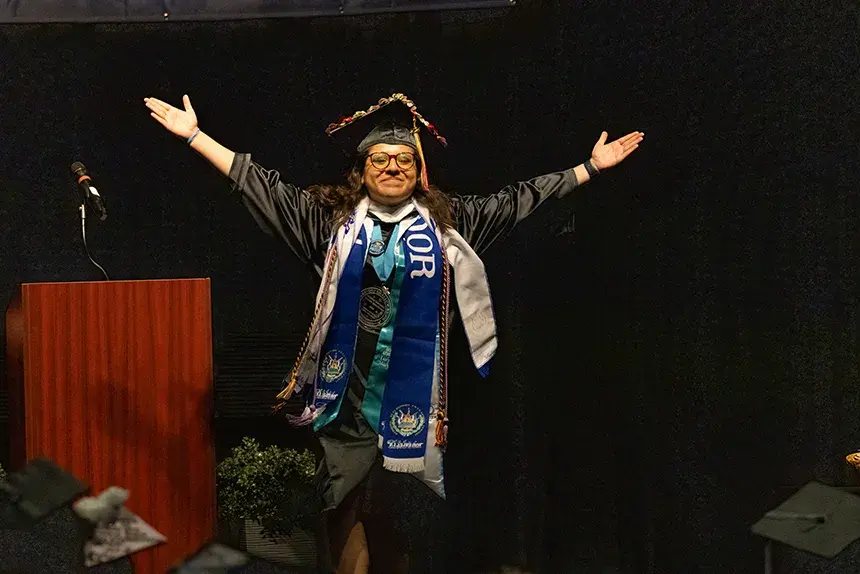RWU Graduates Encouraged to ‘Be Fearless’ and to Always ‘Seek Knowledge’
Shabana Basij-Rasikh, co-founder of the School of Leadership Afghanistan, delivers Commencement address to RWU’s 1,249 graduates.
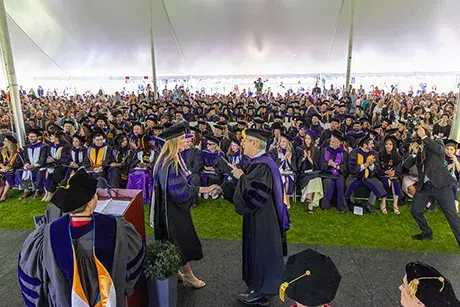
BRISTOL, R.I. – “Be curious. Be fearless. Ask hard questions,” Shabana Basij-Rasikh told Roger Williams University graduates in her keynote address at Friday’s Commencement ceremony. “And with knowledge, with compassion, and with confidence, be the actors who create a better world.”
In her words of encouragement to the Class of 2024, Basij-Rasikh shared her story of seeking an education under a ruling regime that forbade girls from attending school and how that fueled her to later co-found the School of Leadership Afghanistan (SOLA), the first and only remaining boarding school dedicated to educating Afghan girls in the world. Basij-Rasikh launched the school when she was just 18 years old, in her first year of college.
“SOLA is my mission and my life’s work. And while my mission may not be your mission, I wonder if my motivation might be,” Basij-Rasikh said. “With you, I share my motivation: seek knowledge, even to the ends of the Earth.” Use that knowledge to “lift our world to a better place,” she added. “It begins today, and I’m so honored to be with you.”
Growing up in Afghanistan under the Taliban regime in the 1990s, when girls’ education was forbidden by law, Basij-Rasikh said she had to disguise herself in boy’s clothing to attend underground schools in Kabul, run by some of the bravest women she’s ever known – putting herself and her parents at risk. “But they knew that the greatest risk of all was raising an uneducated daughter,” she said.
When she first created SOLA, Basij-Rasikh said they brought girls from all across Afghanistan from all different ethnic groups and created a safe place to learn and grow. But since the Taliban has returned to power, women are again forbidden to attend college or to get an education past the sixth grade, Basij-Rasikh said, choking up on her words, as well as many other freedoms such as choosing their own profession, or visiting a park.
“Days like today, graduation days – those days are dreams you once had, now cloaked in shadow,” she said of the girls and women in her country. “And yet, in Afghanistan – the women, the girls, they are seeking knowledge. And they will go to the ends of the Earth to find it. I know this because I’ve seen it with my own eyes.”
After the Taliban seized power in 2021, Basij-Rasikh evacuated SOLA’s students and staff and re-established the school in Rwanda. SOLA is currently enrolling new Afghan students and launching a new online academy, SOLAx, which will allow them to reach thousands more girls, she said.
Just as she and her students and staff at SOLA have persevered and courageously pursued their dreams of an education, the more than 1,200 graduates of RWU’s Class of 2024 have also followed their paths to converge at this celebratory moment “with the support of each other and the support of your professors and the support of your families.”
The graduates today are “the seekers of knowledge” who “have come through challenges and created their own successes,” Basij-Rasikh said. “You are the curious ones. The thoughtful ones. The fearless ones.”
RWU’s Commencement ceremony celebrated its 1,249 graduates across undergraduate, graduate, and law programs, conferring 872 bachelor’s degrees, 137 graduate degrees, 161 law degrees, 64 associate degrees, and 15 certificates. Of the Class of 2024 undergraduates, 53 percent graduated with a double major or a minor added to their major, embodying the powerful combinations students make at RWU across academic degrees and credentials, internship, practicum and clinical experiences, and student leadership and involvement opportunities.
In his remarks, RWU President Ioannis N. Miaoulis told the graduates that their real-world education has prepared them for successful futures in a world that is constantly changing.
“In your Roger Williams education, you dove deep into understanding and addressing social justice issues and environmental challenges. You are already becoming the changemakers the world needs next,” Miaoulis said. “Let this experience of the wide range of knowledge, skills, and interests you have undertaken at Roger Williams be the guiding light for how you should pursue your next steps in life.”
As the graduates leave RWU and embark on their next chapters, Miaoulis reminded them that they learned to soar in their academic programs and beyond-the-classroom activities. “Now, you will continue to soar higher in your personal and professional lives and to lift others up with you,” he said. “Now is your time to go forth with resolve and make your mark on the world.”
Commencement 2024
Undergraduate student speaker Samuel Trieber ’24 reminded the Class of 2024 that whether they are a “business major predicting the next big burst, a marine biologist researching coral reefs, or an architect designing sustainable buildings,” their experiences at RWU will help them soar to success.
“Before you go on your way to other cities, states, and countries to do great things, reflect on these past years, grasp how much we have grown as people, and know that we are ready for whatever comes next,” said Trieber, a Criminal Justice major and double minor in History and Psychology from Boston, who is on track to complete his M.S. in Criminal Justice by December 2024 through RWU's 4+1 program. “We are ready for big hurdles and small hoops – whatever it takes to achieve the goals we have set for ourselves. In addition to giving yourselves a pat on the back, we should not forget those who have helped us to be here today and be ready for what comes tomorrow.”
As the graduate student speaker, Elisabeth D’Amelio M’24, L’24 opened her remarks with a joke – everyone graduating from RWU is leaving with “one indisputable piece of wisdom: Rhode Islanders are terrible drivers” – which she segued into her message to the graduates to embrace and follow their own unique paths.
D’Amelio, a Juris Doctor and M.A. in Cybersecurity dual degree recipient from Lincoln, R.I., said that it’s common for people to compare their success to how quickly others are achieving theirs. But the RWU graduate program mentality rejects the idea of the “fast lane,” instead championing the idea that achieving success should take “as long as it takes,” she said.
“I hope that … every time comparisons to others leave us unsure, we remember our time at Roger Williams University and are comforted, secure in the knowledge that our efforts here have prepared us for our chosen paths,” D’Amelio said. “Today we receive our diplomas in recognition that we never abandoned our dreams, we never switched lanes, and we have accomplished incredible things because of that.”
Tim Yeaton, a 1980 graduate of the Mario J. Gabelli School of Business and a former president and CEO of multinational software and technology management companies, expressed how honored he was to speak to his alma mater’s Class of 2024.
“Here you are today: a graduating class that fulfilled all the promise from four years ago with tenacity, grit, and a sense of community and self that will bode well for you forever – not just for your individual careers – but for you as a family, bonded through adversity,” said Yeaton, who serves as Chair of the RWU Board of Trustees. “You are the generation destined to change our world.”
Yeaton highlighted how the graduating class has faced many challenges, beginning with the COVID pandemic in 2020, but has preserved “with grit, grace, fortitude, and resilience” to accomplish much over the past four years. Among those achievements, he shared that many undergraduates already have jobs or graduate school lined up and that several sports teams had major wins this year, including the RWU Sailing Team, which placed first at the Inter-Collegiate Sailing Association Open Team Race National Championship, beating out three Ivy League school teams.
“To say that your graduating class is extraordinary would be a gross understatement,” he said.
Welcoming the new graduates to the RWU Alumni Association, Meghan Grady M’08 reflected on her positive experiences at the university. Grady, Executive Director of Meals on Wheels of Rhode Island, said she had an incredible time in RWU’s Master of Public Administration program, learning alongside elected officials, established public servants, community leaders, and decision-makers, which prepared her for a service-based career. “This program set me up for a successful career where I have the opportunity to serve others and make an impact,” she said.
Grady encouraged the Class of 2024 to stay engaged with RWU and in touch with fellow alumni through the Alumni Association. “When you turn your tassel today, your connection to RWU is just starting. The Alumni Association will keep you connected and provide opportunities for you to stay engaged with the university,” she said. “On behalf of the thousands of Roger Williams University alumni, I’m happy to say we are here to help.”
During the university ceremony, RWU celebrated leaders across diverse fields, from education and women's rights, law and diplomacy to environmental science and social activism. RWU presented honorary degrees to Shabana Basij-Rasikh, founder of the School of Leadership Afghanistan (SOLA); Elizabeth Moore, a conservationist and philanthropist who has supported environmental conservation efforts and science education in New England and the Gulf Coast; Arlene Violet, the former Rhode Island Attorney General and the first woman attorney general in the United States, and a trustee emerita of the Roger Williams University Board of Trustees; Anita Earls, Associate Justice of the North Carolina Supreme Court; and William E. Smith, Judge of the U.S. District Court of Rhode Island and longtime member of the RWU Law Board of Directors.
On behalf of the Faculty Senate, the university also presented awards to faculty members in recognition for outstanding and innovative teaching. The Excellence in Teaching Award was given to Robert Engvall, Professor of Justice Studies in the School of Justice Studies, and John Barylick, Chief Justice Weisberger Visiting Professor of Law in the RWU School of Law. The School of Law Faculty of the Year Award was presented to Professor of Law Monica Teixeira de Sousa.
At the School of Law ceremony, Anita Earls, Associate Justice of the North Carolina Supreme Court, who has led a distinguished career in civil rights legal advocacy and litigating voting rights and other civil rights cases, delivered the law school Commencement address.
Drawing from her professional experiences, Earls emphasized the importance of using the law to fight for justice and encouraged the graduates to continue to make meaningful change and remember that defending justice is a team sport.
“Stand up, speak out, let your light shine, and courageously live up to the oath of office you will take as an attorney to uphold the Constitution. Consciously think about how you can advance the principle of equal justice under the law, pursue that unique contribution you have to make. Our future depends on you,” Earls said. “Never underestimate your power to make a difference. You already have the tools, the talents, the passion, and the commitment to advance the law.”
Law student speaker Stefanie Fischer L’24, of Warwick, R.I., congratulated her fellow law graduates on all of their achievements and encouraged them to celebrate not only who they are today but who they will become, reminding them that they will all carry a piece of their shared experience at RWU Law that has shaped them in some way.
“As we stand here, ready to take our next steps, please promise to honor every past and future version of yourself as much as you honor the person you are today. Let our decisions be informed by both the wisdom we’ve gained and the dreams we’re still chasing,” she said. “I am honored to have known you all. May we always be proud, not just of what we’ve accomplished, but of who we were, who we are, and most importantly, of who we are yet to become.”

